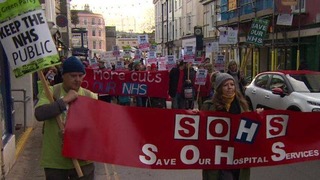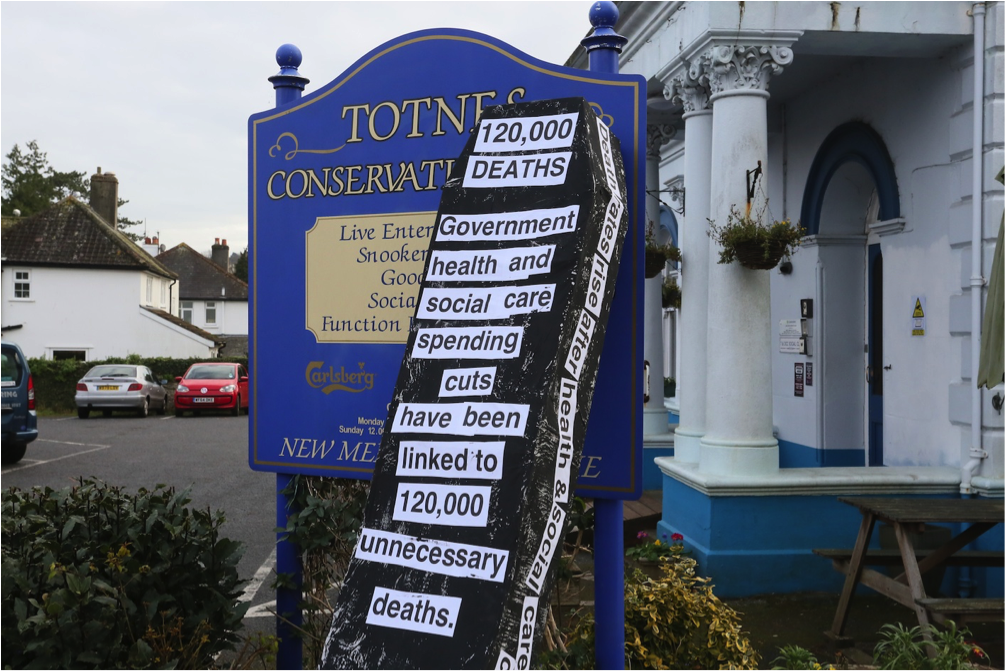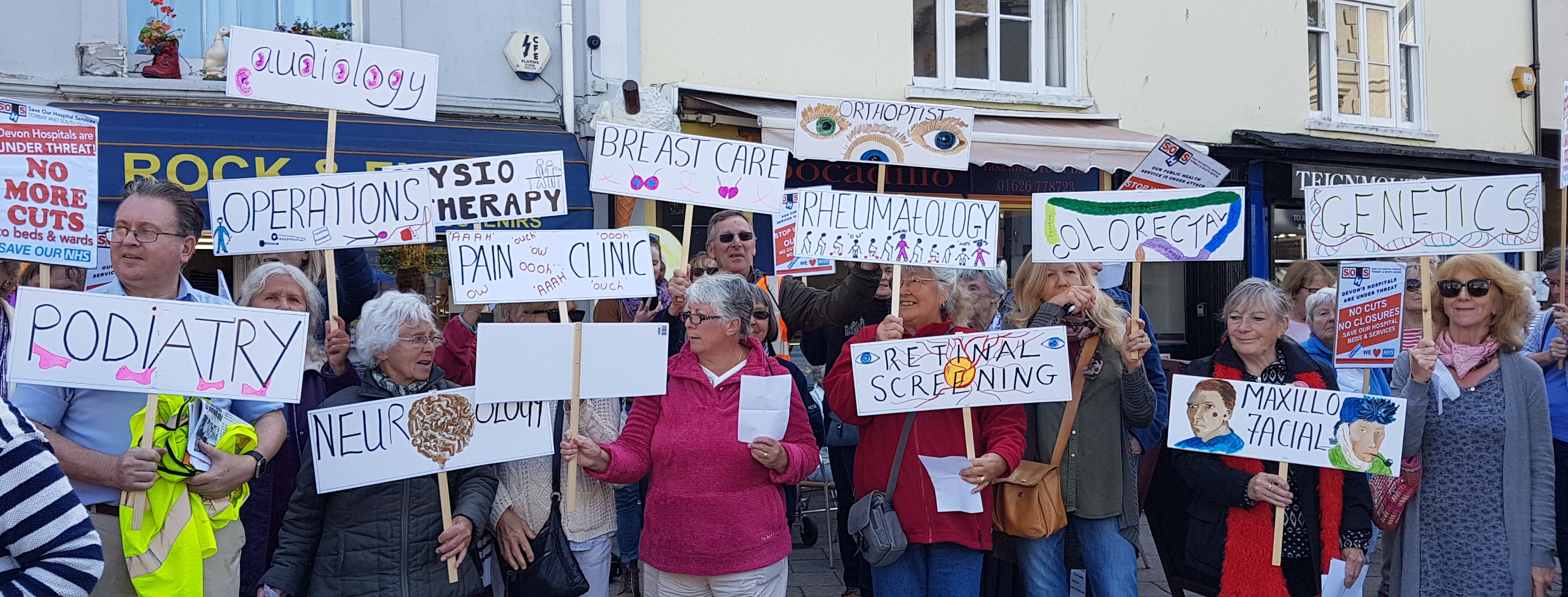Totnes Community Hospital

You may be lucky enough never to have seen behind the long, yellow-grey frontage of Totnes Hospital on Coronation Road. You might be happy just knowing it’s there, with the Fire Station in front and a view to St Mary’s behind – a reminder that when things go wrong, there are people not far away who will come to the rescue. But chances are that you, or someone close to you, has a story like mine.
Ten years ago my two-year-old daughter had an acute attack of croup in the middle of the night. Nothing suggested by the NHS 111 service was working, her breathing was getting louder and more laboured, and she was turning blue. In desperation, I jumped into my car and drove the few minutes to Totnes hospital to find the doors open and a team of trained staff ready to respond.
Since then I’ve met countless people whose childhood broken bones were mended at the hospital, who’ve had their mid-life health scares dealt with, or whose parents spent some of their last days in the care of wonderful staff. It’s part of the fabric of our town.
But all over Devon, towns are losing their community hospitals. In the last 18 months, 112 acute and community beds have been lost in our area alone (Torbay and South Devon). Bovey Tracey and Ashburton have closed, Brixham and Paignton have lost their inpatient wards and minor injury units. Teignmouth and Dartmouth are now under threat, despite promises to residents.
‘Care closer to home’
‘Care Closer to Home’ is the nice-sounding name of part of a plan to reduce Devon’s healthcare spending by £557 million between 2016 and 2021. The Devon area Sustainability and Transformation Partnership (STP) has committed to cutting around 590 hospital beds – one sixth of the county’s total – because, it says, people prefer to be treated in their own home.
for some people it means suffering out of sight, and alone
Community nursing is essential in our rural communities. The community staff do an amazing job, with limited time for each patient, and no specialist equipment or support from a wider medical team. But we know that community care works best when patients are not seriously ill, and when there is the security of nearby medical care if anything does go wrong. That is how community hospitals and home-based care have always worked together.
A survey of ‘care closer to home’ users in North Devon, where this approach has been piloted, found that while patients appreciated the quality of nursing care, not all of them wanted to be cared for at home. The best bed may be ‘your own bed’ if you have family and friends nearby, good transport in case of an emergency, and a manageable health condition. But for some people it means suffering out of sight, and alone.
And the worry is that ‘care closer to home’ is being used to push patients out of NHS care and into the care of social and community services. In Devon, social care is offered by a patchwork of largely private providers that are barely coping with their current workload. Funding for social care is partly means tested, meaning that patients and their families have to pay, and partly funded by our bankrupt local councils.
Paul Raybould, Head of Torbay and Devon’s Trade Council and representative of many nursing and care staff, explains that private care providers pay much less than the NHS. Their staff have lower levels of training and less on-the-job support. ‘In the long term’, he believes, ‘fewer community hospitals and beds will mean all discharges to rural communities who need ongoing support will be to a private nursing home.’
The great NHS sell-off
Another part of Torbay and South Devon’s funding plan is to find major savings to the cost of its buildings and estates. And keeping small hospitals open is bad for the bottom line, regardless of whether it’s good for patients.
A 2016 assessment of community hospital sites found them in ‘sound condition’ but in need of some upgrading. Rather than spending the money the CCG decided to sell them off, raising an expected £3m. There is no guarantee that the proceeds will be spent on equivalent community care in the affected communities. These hospitals were built with public funding or bequeathed to local people as a gift. They have been maintained, improved and equipped by local fundraising efforts over many years. They are not just ‘assets’, they are community resources – a home from home and for many people a last place of rest.

Instead of community hospitals, Devon residents are now being offered healthcare ‘hubs’, with no in-patient care. NHS and private services will be offered under the same roof. The contract to build the new hubs at Dartmouth and Teignmouth has just been awarded to a new ‘Joint Venture’ company, a non-NHS body that will lease the new buildings to the NHS for a profit. What is wrong, you might ask, with using public money to upgrade facilities at the existing NHS hospitals, so they can be used for public healthcare, now and into the future?
The answer to that question is obvious, unfortunately. The NHS does not make a profit. Private finance initiatives do – for their shareholders – while the public owns the risk and pays the debt. After the collapse of Carillion, the National Audit Office reviewed PFI initiatives going back to the turn of the century and found that they had cost the public up to 40% more than simple public procurement of equivalent services. We, the public, still owe more than £200bn on outstanding PFI contracts.
The interest repayments on that debt could run the NHS for two and a half years.
But NHS England continues to insist on competitive tendering, which allows private companies to undercut NHS services, then run them down or demand more funding to keep them going. Virgin Care look as though they have lost their multi-million pound contract to run Devon’s children’s’ services – though no doubt they will appeal. In Bath and NE Somerset, the Head of Virgin Care had to issue a public apology for multiple failings when it took over community health and social care services. Staff were asked not to report their safety concerns to the health watchdog. But Virgin Care continues to run Bath and NE Somerset and 400 health and social care services, worth billions of pounds, across the UK. It has made clear its ambition to dominate the community care sector. Based in the Virgin Islands, the company pays no UK tax.
In Dartmouth, attempts to find beds for NHS patients in a private care home collapsed when the CCG and care-home owners could not agree a suitable price. Our MP Sarah Wollaston, who was asked to intervene, said that this was a purely commercial matter. Of course, if our healthcare services are contracted out to commercial providers, we can expect that commercial interests will dictate the outcome, rather than quality and safety of patient care.
What do local people think?
Some of you will remember when the CCG’s ‘consultation’ roadshow came to the Civic Hall last year. We were given a powerpoint presentation of all the cuts that were needed for the CCG and Trusts to meet the target set by NHS England. When people reasonably asked how we could treat an ageing and scattered population with so much less money, we were told to be realistic. During a brief open discussion several participants expressed outrage at the ‘choice’ we were being offered, but this meeting was still written up as a positive response to the proposed ‘restructuring’.

A more accurate measure of local people’s feelings comes from the widespread support for Save Our Hospital Services (SOHS). Launched in 2016, SOHS is a non-party political campaign to protect hospital beds and services across Devon, to secure proper funding for the NHS, and to prevent further privatization and sell-offs. SOHS is affiliated to Health Campaigns Together, a national umbrella group for actions in support of threatened NHS services.
SOHS, health unions and other campaign groups have found overwhelming support for keeping community hospitals open. There are good clinical reasons for this. Community beds remove pressure on acute beds when patients are no longer critically ill, and provide cost-effective care for long-term and chronic conditions. Patients with minor injuries or on-going conditions can access care where they need it, without long journeys or stressful waits, which make complications more likely.
A growing sense of anger
In December 2017 SOHS organised a march in Totnes, attracting around 300 people. Participants pushed a bed full of Christmas presents, sang carols to staff at the hospital, and listened to speeches against the community hospital closures. Our MP Sarah Wollaston – who is Chair of the Health and Social Care Select Committee in the House of Commons – felt she had been personally intimidated by this event. Many readers of Totnes Pulse will have been there, or know someone who was, so you will have drawn your own conclusions from the row that followed. Certainly a ‘coffin’ was left outside the Conservative club (though not by SOHS, and not while Sarah Wollaston was there). You can decide for yourself whether or not this was personally intimidating, or justified to highlight the British Medical Journal study estimate of 120,000 deaths caused by Tory cuts to health and social care since 2010, which the BBC chose to ignore despite having used BMJ studies a great many times for other non-critical-of-government news stories.

A petition of 3000 signatures was presented to Sarah Wollaston after the Totnes march with a request for her to step in and help save local community hospitals. The petition – addressed to all four Tory MPs in Torbay and South Devon – now stands at 8000 signatures. But the request for help has not been answered.
Earlier this year, SOHS campaigners and sympathetic Council members were successful in persuading Devon CC to pause and review the process of becoming a county-wide ‘accountable care’ or ‘integrated care’ organisation. This would have meant that more NHS services could be privatised, using a population-based model imported from the US. In the event, this decision was overturned by Conservative members in Cabinet. But the Scrutiny Committee vote showed that there is concern at every level about the direction of travel for the NHS in Devon.
This summer, Dartmouth became the focus of the campaign. More than 500 people turned out to a succession of public meetings to express their anger at the closure of the community hospital. A group of local women (Women of Dartmouth and District) formed a vigil at the harbourside site and hundreds of signatures were collected on an SOHS petition against the sell-off.
Dartmouth’s sick and elderly now have to take a long bus journey into Totnes, or Torbay, to have their dressings changed and their conditions monitored. The town is without a hospital, minor injuries unit, ambulance or response car, despite a large elderly population and a busy harbour. Residents believe this has already led to loss of life. They are particularly angry at broken promises that equivalent care beds would be found before the hospital was allowed to close. Although the new healthcare hub is promised, there are no stop-gap arrangements, and residents fear that the current precarious situation will become the new normal for the town.
In Teignmouth this weekend (29/09/18), locals joined hands across Shaldon Bridge and marched on to the Pier to demand their hospital remains open.

Teignmouth was the first hospital to be built under the new National Health Service when it was founded in 1954. Residents don’t want to see it replaced by a ‘Joint Venture’ of public/private services. They don’t want to join Dartmouth residents on the long bus ride to Torbay or Exeter for the care they need.

What next?
We are lucky to still have our community hospital in Totnes. In July, a ‘Happy Birthday’ card was presented to staff as part of the 70th Anniversary celebrations for the NHS. Dedicated healthcare staff and volunteers continue to work their daily miracles, behind those doors. But the same facilities and services are now being used by patients from across the South Hams. People with ongoing, chronic conditions are travelling here from as far afield as Dartmouth and Kingsbridge. No extra beds have been opened in Totnes to make up for those that have been lost elsewhere.
SOHS is also worried about services at Torbay Hospital. The 2016 blueprint identified a range of acute services that – it said – could be ‘rationalised’ to Exeter and Plymouth, including maternity, stroke care and paediatrics. While this plan was quietly put on the shelf before the 2017 general election, the new Devon-wide CCG has been told by NHS England that no area should have more than two sites offering the same acute services. The preferred acute hospitals in Devon are the RDE in Exeter, and Derriford in Plymouth.


[…] Totnesians have long since decided whether this represented a threat against our Conservative MP – who was not in the constituency at the time – or whether it was a lament about deaths that had, tragically, already happened. What is certain is that a claim about intimidation was made and circulated widely in the national press, linked to the death of Jo Cox, alongside my name and an interview with me about the event. […]
Hi Helen. Just read your article on hospital closures etc. Good to see it all written down.
Had a few bits from my experience to reinforce it. I do driving for Dartmouth Caring and am painfully aware of the problems if one happens to live in the Dartmouth area. The appointments people have are in Torbay, Exeter, Teignmouth, Totnes, Brixham and occasionally Derriford. The people I drive are more often than not in their 70’s, 80’s and 90’s. They are often single. They have a myriad of problems with mobility, confusion etc
But, even for simple appointments they are having to travel an hour by car. There is now of course no direct bus service to Torbay hospital. There was but the privatised bus company decided it was not profitable. By bus it’s a 2 hour plus journey by usually 3 buses to get from Dartmouth to Torbay. 3 hours + if possible to get to Exeter. Probably to Teignmouth or Derriford even longer.
There are two choices for patients if they have no one at home to give them a lift as is usually the case. Taxi or Dartmouth Caring. Taxis can cost £40 each way to Torbay, up to £60 each way to Exeter. This for many people who are on very limited pensions or benefits would be a huge lump out of their weekly income.
The bus for many of them would be possible but with mobility problems common, would be a whole day out with lots of standing around in the cold and wet at bus stops etc. To get to a routine appointment. Most just could not do it.
Hospital transport is very difficult to book unless the patient is severely disabled.
Many of these patients have appointments twice in a week, frequently several times in a month.
So, If you live in Dartmouth and other surrounding villages, this is what you have to do.
Dartmouth Caring is a voluntary donation financed organisation so even the donations can sting the patients’ purses.
The situation ends up sometimes where DC cannot find a driver so the patient has to cancel/reschedule the appointment.
Without exception the people I drive to hospital bemoan the lost of Dartmouth hospital services.
Graham
So true what you say I am sure people have died and been left in dire situations What rights do we have under the patients rights and human rights schemes. What action can be taken when all governing bodies don’t listen and follow their own path
Brilliant article Helen! PS do you know that you left a ‘XXXX Link to Details XXXX’ in the text? 🙂
Thank you for pointing that out. It was a reference for a report from the British Medical Journal which has been rectified now.
Not me! I leave that for the lovely editors to sort out though. Thanks for the comment 🙂